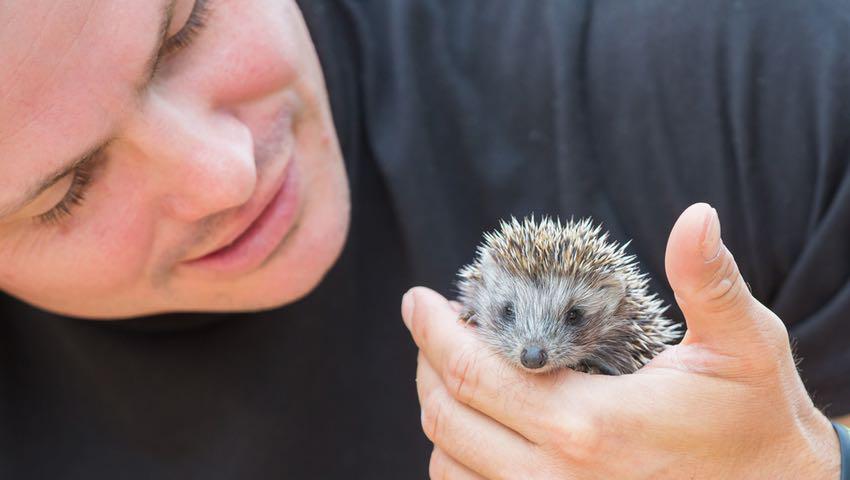A pet store may be your most convenient option for buying a hedgehog. You’re more likely to find healthy hedgehogs and knowledgeable staff at a pet store specifically aimed at exotic pets than a large, more general shop. It’s unfortunately rare to find a large pet store that treats its hedgehogs well.
Too often, they’re kept in overcrowded enclosures by staff with limited knowledge of their dietary and environmental needs. Baby hedgehogs in pet stores are often weaned too early - sometimes as young as 3 weeks, about half the time they’re supposed to stay with their mother. The long-term impact of early weaning on the animal’s health often can’t be undone.
If you buy your animal from a pet store, make sure to check out the cage where it’s being housed. If the cage is dirty, overcrowded, or lacks sufficient food, water, and hiding places, you should not buy your hedgehog there. The animal will likely have health issues that could mean costly vet bills down the line, and it’s likely to be improperly socialized (the grasping hands of so many strangers may make the animal permanently wary of handling).
You might feel compelled to rescue the animal from deplorable conditions, but remember the business aspect of the pet trade. If you buy this animal, you’re giving this shop your money, and supporting their continued mistreatment of small animals.
If you do buy an animal from a pet store, it’s advisable to buy a male instead of a female. Though it’s not healthy for female hedgehogs to breed before 5 months of age, they’re sexually mature as early as 8 weeks. A lot of pet stores will let males and females cohabitate when they’re young assuming no breeding can take place. Add the fact that it’s extremely difficult to tell when a female hedgehog’s pregnant, and you could end up bringing home the hedgie equivalent of a teenage mother.
Aside from the health complications from this (and the fact that you now have 4-10 pets when you planned on having one) this often means hedgehogs are breeding with their siblings and can result in inbred offspring. Inbreeding leads to both psychological and physiological issues. If the pet store staff has trouble differentiating between male and female animals, you shouldn’t buy a hedgehog there.
Hedgehog Breeders
A reputable breeder is the best place to buy your hedgehog. There are both good and bad breeders. The size of the operation is not the best indication of the quality - there are great large operations, and sub-par smaller ones.
Like with pet stores, look at the enclosure where your hedgehog’s being kept and make sure it’s clean and not overcrowded. Be wary of any breeder who won’t let you see the cages unless they give a good reason for the omission (e.g. there’s a very pregnant female who shouldn’t be disturbed, or a new litter of hoglets).
Breeders are also the best place to look for specific color variants. The breeder should be able to provide at least five generations of lineage for your animal. This shows you two very important things: That the animal is not inbred, and that it’s been selectively bred for a good personality.
Generally speaking, hedgehogs bought from breeders are more accustomed to humans and friendlier overall.
A good breeder will be able to do more than simply sell you a pet. They’ll be able to answer any questions you have about the animal’s care and show you how to properly handle the hedgehog. You should also ask the breeder for recommendations on finding veterinary care. If they’re willing to give you the name of their vet, this could be an ideal option - that vet may already have a relationship with your animal.
If the breeder is unable to tell you where the closest vet is, that’s a pretty big warning sign, because it means they’re not taking the animals in for regular check-ups (if they simply can’t give you that vet’s information because he’s full or only works with breeders, that’s unfortunate but acceptable).
Hedgehog Rescue Shelters
A rescued hedgehog is not the best pet for a first-time owner. These animals come with a history, and it’s rarely a happy one. Improper nutrition and housing may have given it chronic health issues, which could translate to costly vet visits. Past neglect or bad experiences with handling could also make it standoffish or especially timid around people. A rescued hedgehog can take a long time to start trusting people again, and may never be as friendly as one bought young from a breeder.
The advantage of rescuing a hedgehog, of course, is that you’re providing a home for an otherwise abandoned animal. If you feel up to the challenge, the International Hedgehog Association has a state-by-state listing of rescue organizations on their website (http://www.hedgehogclub.com/rescue/).
Make sure you are prepared for the extra time and financial investment before adopting - you’re not doing yourself or the animal any favors if you have to abandon it again because its care is more work than you expected.


